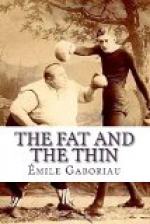And she did not change again. This was her last trade. Still, she often neglected her osier tray to go rambling about the neighbourhood. The building of the central markets—as yet incomplete—provided both children with endless opportunities for amusement. They made their way into the midst of the work-yards through some gap or other between the planks; they descended into the foundations, and climbed up to the cast-iron pillars. Every nook, every piece of the framework witnessed their games and quarrels; the pavilions grew up under the touch of their little hands. From all this arose the affection which they felt for the great markets, and which the latter seemed to return. They were on familiar terms with that gigantic pile, old friends as they were, who had seen each pin and bolt put into place. They felt no fear of the huge monster; but slapped it with their childish hands, treated it like a good friend, a chum whose presence brought no constraint. And the markets seemed to smile at these two light-hearted children, whose love was the song, the idyll of their immensity.
Cadine alone now slept at Mother Chantemesse’s. The old woman had packed Marjolin off to a neighbour’s. This made the two children very unhappy. Still, they contrived to spend much of their time together. In the daytime they would hide themselves away in the warehouses of the Rue au Lard, behind piles of apples and cases of oranges; and in the evening they would dive into the cellars beneath the poultry market, and secret themselves among the huge hampers of feathers which stood near the blocks where the poultry was killed. They were quite alone there, amidst the strong smell of the poultry, and with never a sound but the sudden crowing of some rooster to break upon their babble and their laughter. The feathers amidst which they found themselves were of all sorts—turkey’s feathers, long and black; goose quills, white and flexible; the downy plumage of ducks, soft like cotton wool; and the ruddy and mottled feathers of fowls, which at the faintest breath flew up in a cloud like a swarm of flies buzzing in the sun. And then in wintertime there was the purple plumage of the pheasants, the ashen grey of the larks, the splotched silk of the partridges, quails, and thrushes. And all these feathers freshly plucked were still warm and odoriferous, seemingly endowed with life. The spot was as cosy as a nest; at times a quiver as of flapping wings sped by, and Marjolin and Cadine, nestling amidst all the plumage, often imagined that they were being carried aloft by one of those huge birds with outspread pinions that one hears of in the fairy tales.
As time went on their childish affection took the inevitable turn. Veritable offsprings of Nature, knowing naught of social conventions and restraints, they loved one another in all innocence and guilelessness. They mated even as the birds of the air mate, even as youth and maid mated in primeval times, because such is Nature’s law. At sixteen Cadine was a dusky town gipsy, greedy and sensual, whilst Marjolin, now eighteen, was a tall, strapping fellow, as handsome a youth as could be met, but still with his mental faculties quite undeveloped. He had lived, indeed, a mere animal life, which had strengthened his frame, but left his intellect in a rudimentary state.




